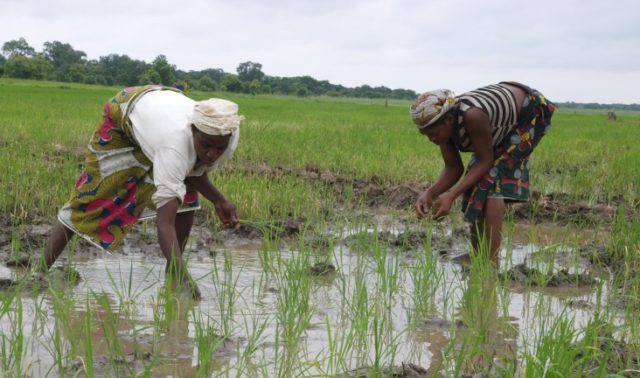Agriculture
The Benefactions of Agricultural Industries to Nigeria Economy -By Abdulazeez Taufeeq
Most of the benefits of government agricultural support through agencies like the Nigerian Agricultural Cooperative and Rural Development Bank (NACRDB), Nigerian Agricultural Insurance Corporation (NAIC), and a host of others hardly get to the resource-poor farmers.

“If agriculture is to redeem its promise of being the driving force of economic growth, it needs greater attention in development policies and precedence.”
The benefactions of agricultural industries to Nigeria’s economy can’t be overlooked as it has contributed to part of the national economy. Sustainable Agricultural development is one of the main prerequisites for growth and stability of the economy of an agrarian Nation like Nigeria- a Nation that is highly endowed with both human and natural resources- which favour both crop and livestock production. The contributions of the agricultural sector to the Nation’s economy in the pre and postcolonial era when agriculture was the main thrust of the economy, even now because the essential nutrients needed for growth and well-being are from this industry for that it cannot be overemphasized. Animal agriculture is an indispensable pre-requisite towards the sustainability of human development because of food provision, employment generation, etc (Oluwafemi, et al, 2001). In Nigeria, a high percentage of the population earns their living from agriculture and agriculture-oriented activities and therefore contributes to the development of the Nation.

2 History Agricultural output, which fell from 1970 to 1974, has since stood still. The high growth rate of the Nigerian economy over the last ten years has not affected the agricultural sector, whose share in the GDP is estimated to have fallen from 36% in 1970 to 25% in 1974 and (according to ILCA estimates) to 20% in 1978. The followings are the area in which animal agriculture has contributed immensely to the growth of Nigeria economy;
1 LivestockAgriculture, Forestry, Fishing, and Livestock account for 18-20% of Nigeria’s GDP (Gross Domestic Product) with livestock alone accounting for 4.5 – 5% (FAO,1987). The part played by livestock in the economy is relatively modest, representing approximately 10% of agricultural activity and less than 3% of the GDP. Statistical data for the livestock sector are scarce. According to official estimates, the national herd in 1974 numbered 8.5 million cattle, 22 million goats, 8 million sheep, 50 million poultry (45 million in the rural and 5 million in the commercial sector) and 500,000 pigs (450,000 in the rural and 50,000 in the commercial sector).
There has been no official estimate made since 1974, but the results of ongoing surveys in the field indicate that the cattle herd has more or less recovered from the effects of the drought. On the basis of this data and using the ILCA Bulletin’s usual conversion rates, the number of ruminants stands at some 13 million livestock units (LU), i.e. 17 livestock (LU) per 100 inhabitants. This is a very low figure compiled by the National Livestock Development Committee. Nevertheless, the FAO, whose estimates were largely used to complement those of the Nigerian Government, estimated the cattle herd at 11.5 million in 1977/78. One livestock unit (LU) equals one head of cattle or six sheep/goats.
In the same vein, anon (2006) reported that the Nigerian agricultural sector has continued to play a pivotal role in the rapid economic transformation of the Nation with the impressive performance accounting for 41% of the Country’s Gross Domestic Product, 80% of the non – oil foreign exchange earnings and over 60% of the active labour force in the country. Livestock have the characteristics of a capital investment yielding an interest in the form of milk, eggs, and other valuable products (Oluwafemi et al, 2001). Apart from serving as a source of food for humans, animal agriculture is also important in providing non- food materials such as source income by marketing of hides, skin, wool and feather which are in turn used as raw materials for manufacturing other valuable products e.g hides as skin for leather goods.
4 Livestock Marketing of livestock such as cattle, goats, sheep, pigs, and birds, etc. Which showed the need for attention in the enterprise. An enterprise that is not properly supervised by the government and an enterprise that is viable to the extent of solving a considerable percentage of unemployment problems facing the nation. The restoration of the collective will in the minds of the various operators in the agricultural industry is paramount in efforts to step up production (Onucheyo, 1998). According to this author, agriculture will have to be repackaged, just like an attractive product for investors to buy. This product must be promoted properly. It must have the right price and must be sold to the right people at the appropriate places. This has been the complaint of the seller of these animals that the buyer is not ready to buy animals as it was required by the sellers. As such, the farmers are afraid of the administration of lost.
The present situation of the country as exposed the livestock sub-sector which has not been given attention and makes it an insignificant contribution above the present level to the Nation’s GDP as the result of the potentials inconsiderably utilization and effect of the COVID-19 pandemic.
3 Effects of Lockdown and Restrictions on animal agriculture as Result of the COVID-19 Pandemic.These are some of the rules and guidelines given by the NCDC which affected the market of animals production in the country such as;
• Mandatory use of non-medical face mask/covering in public spaces
• Mandatory provision of handwashing facilities/sanitizers and extensive temperature checks in all public spaces
• Physical distancing of 2 metres between people in workplaces and other public spaces
• Prohibition of gathering of more than twenty (20) persons outside of a workplace
• Nationwide curfew from 10pm to 4am to limit social interactions and reduce the risk of transmission of COVID-19.
• Controlled access to markets and locations of economic activities.
• Prohibition of non-essential interstate travel except goods and services etc. The restoration of these past achievements requires collective and sincere commitment of all stakeholders. Focus on agriculture is not a misplacement, although, both the previous and present administrations in Nigeria through the Federal Ministry of Agriculture has put in place several programmes and policies towards the goal of food security, these efforts have always been confronted with a number of constraints such as crop and livestock Pete’s and diseases among others.
5 Eid-l Kabir FestivalThose preparing for eid-l Kabir festival is ready to withdraw back from buying of animals for there festival due to the prise of the animal as a result of money in circulation in the country. Whereas as the sequel low purchase of animals, the small scale sellers are crying out of running down in there business.
Analogous Policies and decisions that will allow government incentives such as loans to get to the farmers should be properly implemented. In the past, most of the benefits of government agricultural support through agencies like the Nigerian Agricultural Cooperative and Rural Development Bank (NACRDB), Nigerian Agricultural Insurance Corporation (NAIC), and a host of others hardly get to the resource-poor farmers. Beseech the government to make loans accessible to then and give then moratorium before repayment.
This is most cases is due to stringent conditions such as presentation of collateral security attached to such facility, and this can hardly be met by majority of the farmers. This situation should be carefully looked into by the authorities concerned with the provision of such a facility in order to achieve the goals of poverty reduction, employment generation, and sustainable economic development among others. Training and engagement of more livestock extension agents will no doubt make a positive contribution to this effort.
If agriculture is to redeem its promise of being the driving force of economic growth, it needs greater attention in development policies and precedence.
Value your pen, protect your image and dignity because what you write on paper, voice out and social media give details about you.
Abdulazeez Taufeeq by name an instructor in Federal College of Horticulture Gombe, Gombe State.

















